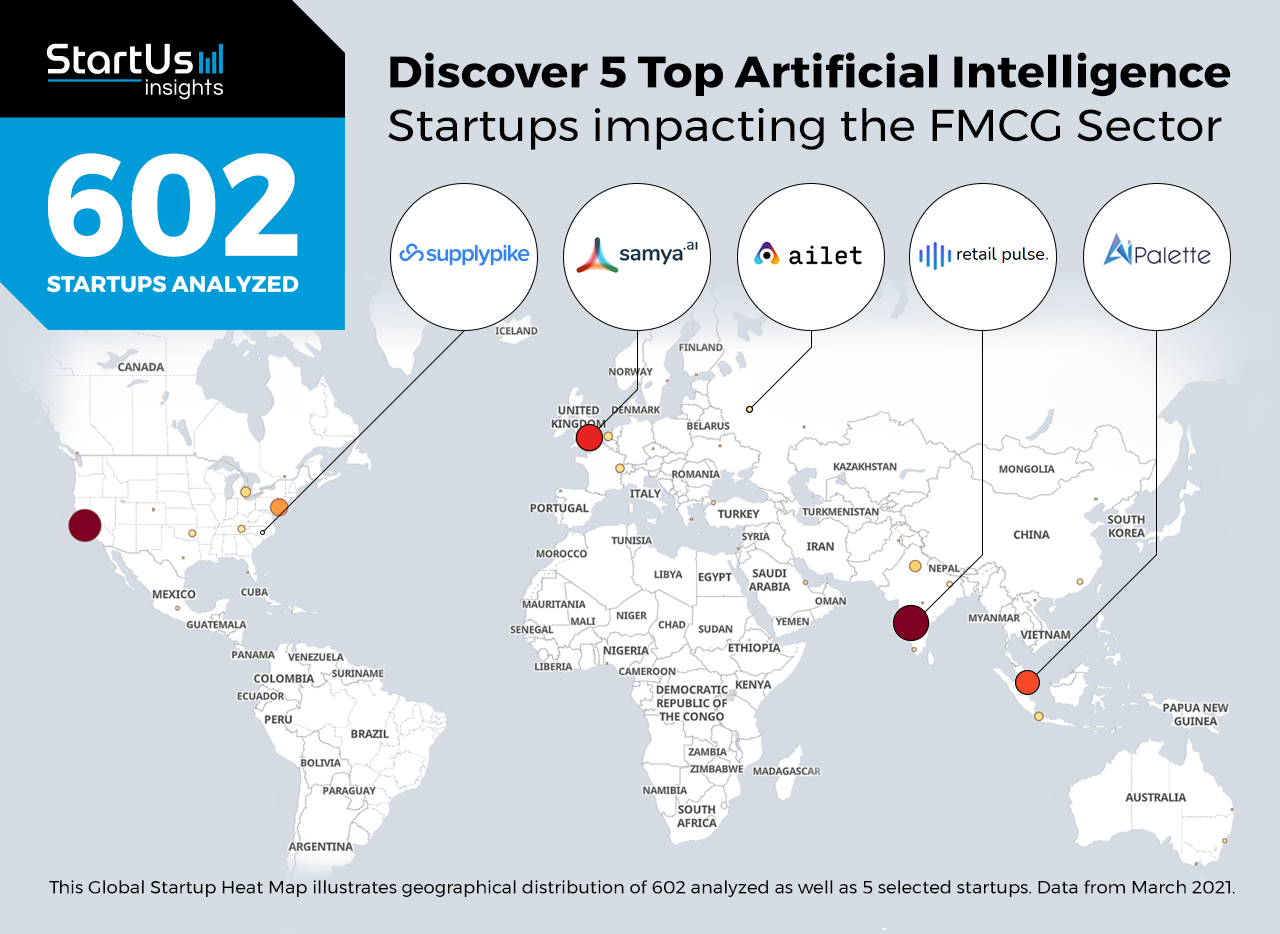Staying ahead of the technology curve means strengthening your competitive advantage. That is why we give you data-driven innovation insights into the fast-moving consumer goods (FMCG) industry. This time, you get to discover 5 hand-picked startups developing artificial intelligence (AI) solutions.
Global Startup Heat Map highlights 5 Top Artificial Intelligence Startups out of 602
The insights of this data-driven analysis are derived from the Big Data & Artificial Intelligence-powered StartUs Insights Discovery Platform, covering 1.379.000+ startups & scaleups globally. The platform gives you an exhaustive overview of emerging technologies & relevant startups within a specific field in just a few clicks.
The Global Startup Heat Map below reveals the distribution of the 602 exemplary startups & scaleups we analyzed for this research. Further, it highlights 5 FMCG startups that we hand-picked based on criteria such as founding year, location, funding raised, and more. You get to explore the solutions of these 5 startups & scaleups in this report. For insights on the other 597 artificial intelligence solutions, get in touch.
AI Palette provides AI-based Consumer Needs Analysis
The fast-moving consumer goods industry involves a significant number of products that find use in people’s everyday lives. Understanding consumer preference is integral for the success of FMCG products in the market. AI and machine learning (ML) algorithms accurately predict consumer trends and give FMCG companies a first-mover advantage. Unlike traditional research, these insights are based on real-time data, thereby providing an opportunity to make informed decisions and stay ahead of competitors.
Singaporean startup AI Palette uses AI to better understand consumer needs. The startup’s unique natural language processing (NLP) algorithm helps comprehend human conversation as it is implied, processing social media data to predict trends. The startup’s patented machine learning algorithm identifies the maturity of a trend and predicts its future trajectory to enable FMCG companies to design products accordingly. This way, the ML algorithm enables companies to screen, validate and optimize new product concepts before finalizing the best concept.
Samya.ai develops Consumer Packaged Goods (CPG) Platform
Since rapidly changing consumer trends require new products, understanding product performance is crucial. For example, sales promotions are one avenue that FMCG companies use to ensure effective marketing of their products by retailers. The automation of sales promotions based on real-time sales data ensures that FMCG companies can effectively focus on problem areas and reduce their losses considerably. To this end, startups develop SaaS platform solutions to understand sales promotion risks and rewards.
British startup Samya.ai develops an AI-based, software-as-a-service (SaaS) SaaS platform for consumer packaged goods. The startup’s platform anticipates sales risks & opportunities, harmonizes sales activity with supply and demand indicators, and stops sales leaks to increase overall profits. Additionally, the platform forecasts tactical product promotion risks to improve the return on investment (ROI) and margins for CPG companies.
Retail Pulse offers Shelf Analytics and Competitor Insights
Understanding the competition is essential for FMCG companies due to the fast-paced nature of products in the market. Competitive insights enable FMCG companies to keep up with major players in the market and to retain market share. AI and ML enable real-time shelf analytics and provide FMCG manufacturers insights on how the products move from retailer to consumer in comparison to their competitors. As a result, startups develop shelf analytics solutions to derive insights into competitor performance.
Indian startup Retail Pulse offers shelf analytics and competition insights for CPG companies. Retail Pulse leverages AI to detect every stock-keeping unit (SKU), company promotional tools, and assets including banners and shelf space. This data is used to analyze the potential of every store in combination with geo-data and demographics. As a result, FMCG companies better understand the visibility of their products based on store lighting, customer psychology, and competitor’s activity.
Ailet improves Retail Execution
Salesmen spend a considerable amount of time checking retail inventory levels and fill paperwork instead of focussing on ways to increase the sales of consumer products. Computer vision and image recognition enable salesmen to eliminate the paperwork and focus more on sales efforts. Moreover, computer vision also gives insights into how brands improve product placement and make visual displays more appealing and effective for consumers.
Russian startup Ailet leverages computer vision and AI to improve the retail execution of CPG companies. The startup’s in-store execution product offers a comprehensive real-time view of store and field performance across all retail channels. This helps CPG companies to maximize their earnings from the shelves. Moreover, the startup’s computer vision technology drives targeted actions at SKU, brand, and category level, and improves overall sales.
SupplyPike develops an On-Time & In-Full (OTIF) Radar
Stockouts occur often in the FMCG industry due to the fast-paced nature of the market and unpredictable consumer demand. These stockouts come with hefty fines and reduce profits for manufacturers. However, AI-based automated software optimizes demand planning in real-time to avoid stockouts and improve fulfillment targets on-time and in-full.
The US-based startup SupplyPike develops an OTIF radar for FMCG companies to keep a track of their product fulfillment requirements and avoid fines. The startup’s solution automatically extracts and retains actionable data to predict future OTIF fines. This enables FMCG startups and companies to reduce their exposure to unnecessary risks. Additionally, the solution optimizes the supply chain to reduce stockouts at the customer’s end.
Discover more FMCG Startups
FMCG startups such as the examples highlighted in this report focus on supply chain management, indoor navigation, and consumer interaction. While all of these technologies play a major role in advancing the FMCG industry, they only represent the tip of the iceberg. To explore more FMCG technologies, simply get in touch to let us look into your areas of interest. For a more general overview, you can download our free Industry Innovation Reports to save your time and improve strategic decision-making.


![AI Implementation | A Comprehensive Strategic Guide for Enterprises [2025-2030]](https://www.startus-insights.com/wp-content/uploads/2025/04/AI-Implementation-SharedImg-StartUs-Insights-noresize-420x236.webp)

![AI in Agriculture: A Strategic Guide for Industry Leaders [2025-2030]](https://www.startus-insights.com/wp-content/uploads/2025/03/AI-in-Agriculture-SharedImg-StartUs-Insights-noresize-420x236.webp)




